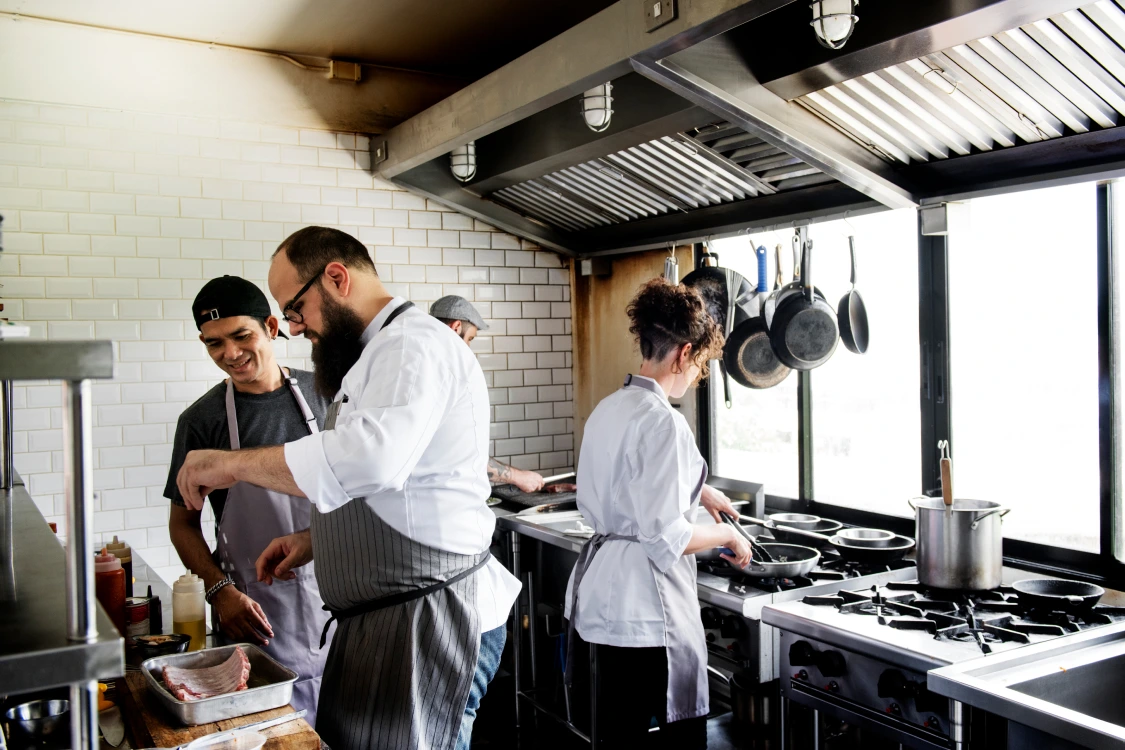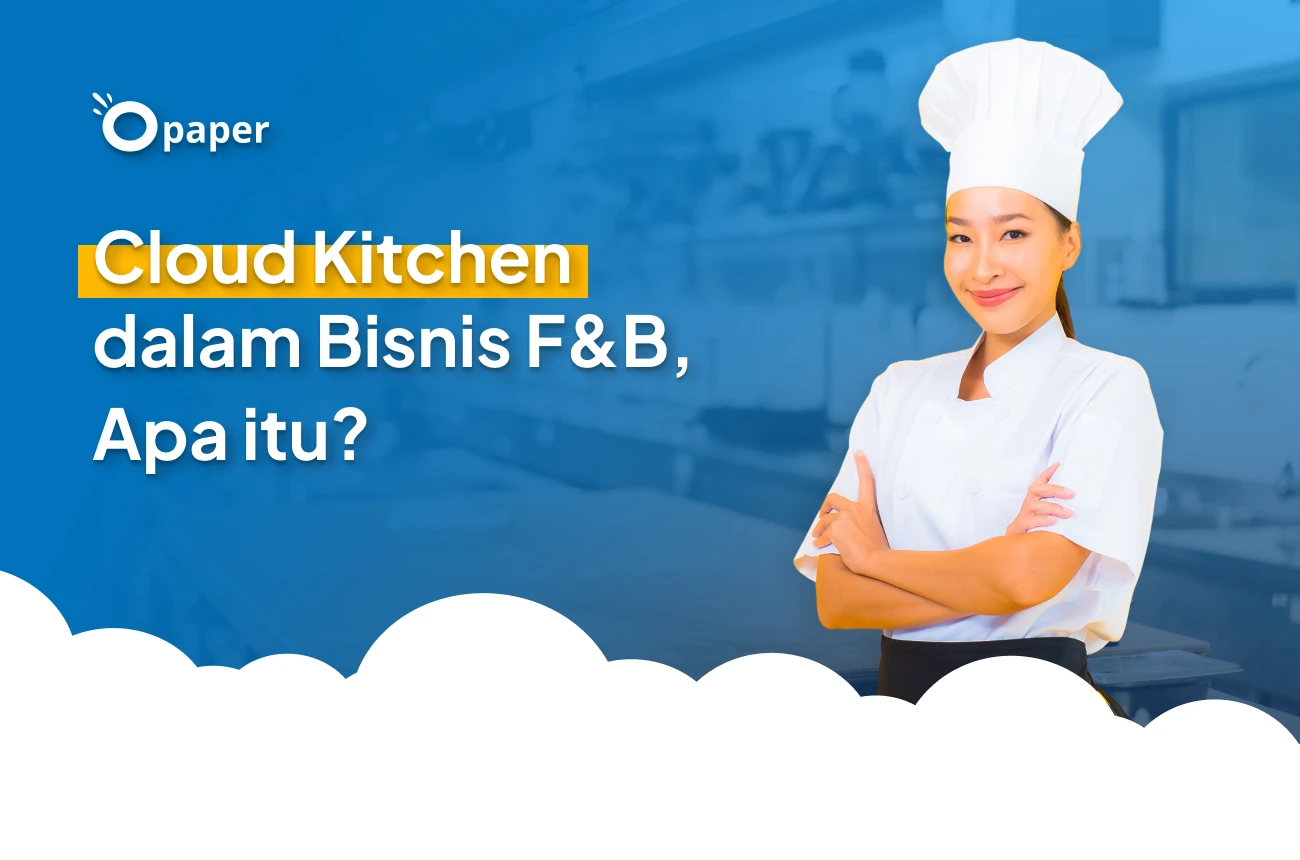Advancements in technology have brought about various new innovations. In the future, many businesses will increasingly implement cloud-based systems for various fields. Starting from cloud computing, cloud hosting, cloud storage, and many more.
And lately, these cloud-based systems have expanded into the culinary or F&B business, known as cloud kitchen. This business model is still relatively new.
You might still be unfamiliar with the term cloud kitchen or what is commonly known as a ghost kitchen. According to yummykitchen.com, the cloud kitchen business model is similar to a coworking space, renting out space. Yes, so a cloud kitchen provides a shared kitchen for producing food from various culinary brands.
So, for example, a culinary entrepreneur who rents a kitchen then the kitchen company divides the space into several kitchens and rents them out. Later, the culinary entrepreneurs or F&B brands can produce their goods there.
Now, this article will discuss in more detail what a cloud kitchen is, its types, and its advantages and disadvantages. Let's dive right into the review:
Understanding Cloud Kitchen

According to research by Nindya Anggita Machdar and Fergy Fharadiva Andreas in 2021, the meaning of cloud kitchen is a food or beverage service business system that only offers food delivery or take-away services. Thus, the cloud kitchen business model does not provide dine-in services.
An owner or manager of a cloud kitchen will eventually build a large kitchen divided into several booths, which are then rented out to F&B entrepreneurs.
When an F&B business owner rents a booth in a cloud kitchen, every online food order will be directly forwarded to the kitchen, and once ready, it will be delivered by a food delivery courier service.
Because it does not serve dine-in orders, this is why F&B businesses with a cloud kitchen system have faster product delivery compared to regular restaurants.
How Cloud Kitchen Works
In practice, cloud kitchen or ghost kitchen businesses allow customers to simply order food through a specific app. The app will offer a variety of food options from different restaurants.
The kitchen in a cloud kitchen can be a room with complete facilities. Thus, it can be used to cook a wide variety of menus from the different restaurants available.
As quoted from iPaper on academia.edu uploaded by Digital Now, the risk of loss in the cloud kitchen model tends to be low. The cloud kitchen business model can also increase productivity for entrepreneurs.
Development of Cloud Kitchen Business in Indonesia
The development of the cloud kitchen business cannot be separated from the increasing consumer interest in food delivery services.
According to katadata.co.id, the food delivery service market continues to grow according to a report from Google, Temasek, and Bain. They predict that global transactions for food delivery services will reach US$20 billion by 2025.
In addition to interest, the number of internet users in Indonesia also affects the growth of the cloud kitchen business.
Based on data from Hootsuite, as many as 74.4% of internet users in Indonesia aged 16-64 years in 2021, and they are recorded as using delivery services for F&B product purchases.
They also tend to order food more than other products. With such good business growth and potential, it's no wonder that the cloud kitchen or satellite kitchen business is projected to proliferate in Indonesia, especially in big cities.
Advantages and Disadvantages of Cloud Kitchen

Before deciding to run an F&B business with a cloud kitchen system, it's a good idea to first understand the advantages and disadvantages of using a cloud kitchen system. Here's the review:
Business Benefits of Cloud Kitchen
1. Save on capital
The first advantage you'll get when running an F&B business with a cloud kitchen system is saving on business capital. Because you don't need to rent a business space since the business is run entirely online.
Moreover, as is known, starting a restaurant requires a considerable initial capital because it also has many needs.
Some things that need to be prepared at the beginning for making a restaurant include a building or place in a strategic location, cooking and eating equipment, employee salaries, and so on. From there, you can imagine how much capital needs to be prepared to open a conventional F&B restaurant business.
If you only have a little capital, a cloud kitchen can be one solution. With a cloud kitchen system, you don't need to build a restaurant, just pay the rent at the cloud kitchen.
2. Complete kitchen facilities
Even though you're just renting a cloud kitchen, you still get complete kitchen facilities. All business operations related to the kitchen can be carried out immediately once you rent a place in a cloud kitchen. This is very beneficial because you can save a lot of operational costs.
3. Guaranteed quality of raw materials and cleanliness
In the cloud kitchen business, operators and business owners can focus on the kitchen and food and beverage production. They no longer need to worry about how to provide dine-in services to customers. Therefore, both owners and renters in cloud kitchens can focus more on cleanliness of the place and food.
Not only that, but the selection of raw materials is also a main concern for owners and operators. So, only quality raw materials are used in this kitchen. With hygienic processing, the quality of the food and beverages produced is better.
4. Small risk
If you are new to the F&B business world, a cloud kitchen can be a business option to choose. Because renting a kitchen in a cloud kitchen is not as expensive as starting a business from scratch independently. You can use this momentum to learn and experiment.
Because the risk of loss that might occur if you fail is smaller, the opportunity to try various things is greater. It's like the cloud kitchen is a swimming pool while conventional restaurants are the ocean.
Disadvantages of Cloud Kitchen Business
Although the business risk of a cloud kitchen is considered small, you can't take it lightly. Remember, it's still a business, and there are always pros and cons. Here are some risks or disadvantages of the cloud kitchen system:
1. Intense competition
When renting a kitchen in a cloud kitchen, you will certainly meet many other culinary entrepreneurs who may have similar products.
When this happens, competition is inevitable. To win the competition, you must have a more attractive unique selling proposition than your competitors. If there is no uniqueness to your business, you might be the one to fall.
2. Doing your own branding
Cloud kitchens do provide kitchen facilities to business owners, but don't think that they also help you with branding. There are operators that offer branding facilities, but most do not provide them.
So, like it or not, you have to build your business branding independently. If you already have experience in the food and beverage business, this might not be difficult. However, new culinary entrepreneurs will face the opposite situation.

